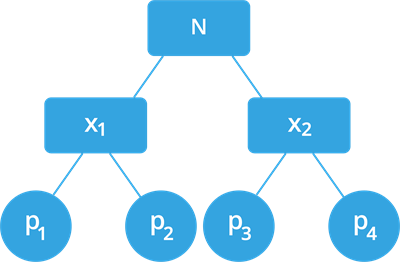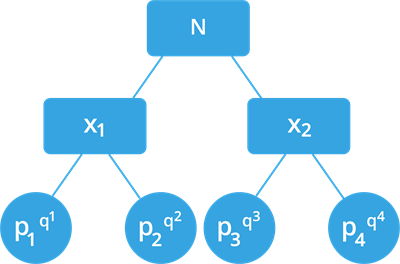
PUMPA - SMART LEARNING
எங்கள் ஆசிரியர்களுடன் 1-ஆன்-1 ஆலோசனை நேரத்தைப் பெறுங்கள். டாப்பர் ஆவதற்கு நாங்கள் பயிற்சி அளிப்போம்
Book Free DemoTheorem:
Every composite number can be expressed (factorised) as a product of primes, and this factorization is unique, apart from the order in which the prime factors occur.
Explanation:
Let us take the composite number N.
Decompose the number N into the product of primes.

Here, the number N = x_1 \times x_2. But, both x_1 and x_2 are again composite numbers. So, factorise it further to obtain a prime number.
The prime factors of x_1 = p_1 \times p_2.
The prime factors of x_2 = p_3 \times p_4.
We get, N = p_1 \times p_2 \times p_3 \times p_4 where p_1, p_2, p_3 and p_4 are all prime numbers.
If we have repeated primes in a product, then we can write it as a power.

In general, given a composite number N, we factorise it uniquely in the form where are prime numbers, and are natural numbers.
Thus, every composite number can be expressed as a product of primes apart from the order.
Example:
Consider a composite number 26950.
Let us factor this number using the factor tree method.

The prime factor of 26950 = 2 \times 5 \times 5 \times 7 \times 7 \times 11.
That is, 26950 = 2 \times 5^2 \times 7^2 \times 11.
Here, a composite number 26950 is written as a product of prime numbers.
If we change the order of the prime numbers, the answer will also be the same composite number.
We can write 26950 = 2 \times 7^2 \times 5^2 \times 11 or 26950 = 11 \times 7^2 \times 5^2 \times 2.
Thus, the prime factorization of a natural number is unique, except for the order of its factors.
Important!
Recall:
HCF = Product of the smallest power of each common prime factor in the numbers.
LCM = Product of the greatest power of each prime factor involved in the numbers.